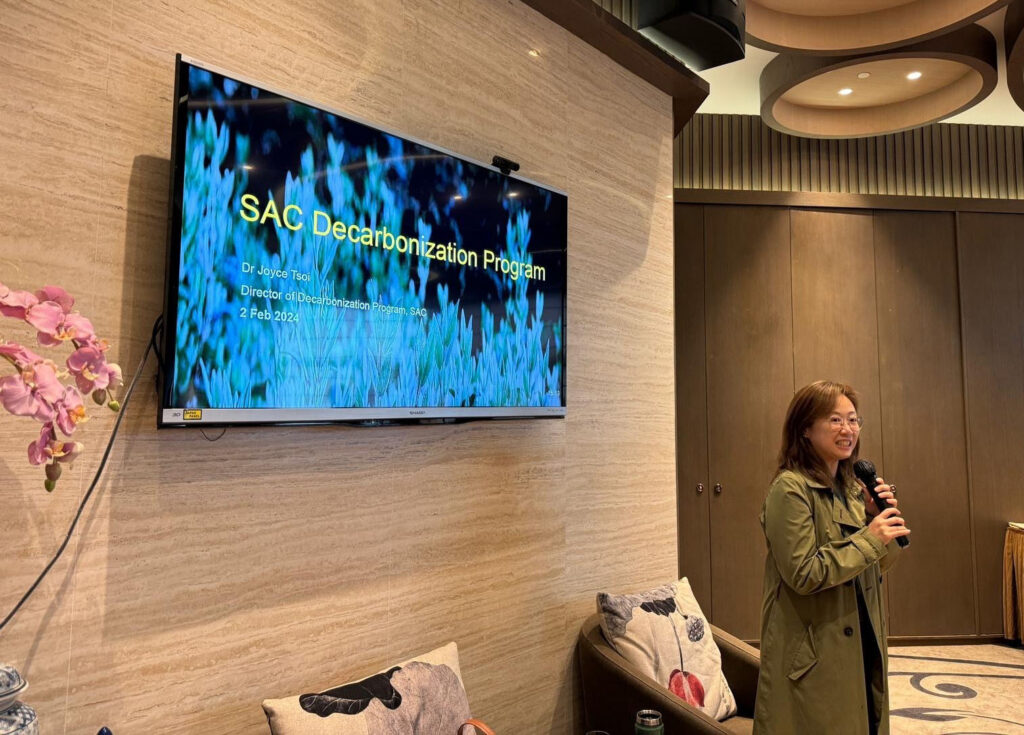
Dear Fashion: Let’s Step Up and Get Aligned
In a recent opinion editorial with WWD, CEO Colin Browne argues fashion needs to take more serious and coordinated action on sustainability. Read the highlights here!

Joyce Tsoi, SAC Decarbonization Program director, spoke at a recent Hong Kong Intimate Apparel Industries Association (HKIAIA) cocktail reception that centered around the theme of “carbon.” With Chinese New Year around the corner, Tsoi greeted all members by wishing everyone a joyous and prosperous Chinese New Year. Tsoi called out that climate change is an urgent and time-sensitive issue, it requires “a global collective effort to align on all areas of climate actions from rapidly reducing emissions to strengthening resilience to a changing climate and extreme weather events and motivate change in apparel and beyond.”
After sharing an overview of the SAC’s mission to transform business for exponential impact through groundbreaking tools, collaborative partnerships, and trusted leadership for industry sustainability, Tsoi explained the organization’s vision of a global consumer goods industry that gives more than it takes to the planet and its people. With over 300 member organizations in 36 countries, Tsoi explained, the SAC is committed to solving the industry’s most urgent and systemic challenges through multi-stakeholder engagement, creating a more sustainable, equitable, and just world for all.
The SAC refined its strategic plan in 2023 to “Evolution for Impact” and established climate change, decent work, and nature-positive future as its three foundational pillars, which drive impact, initiatives, and partnerships. Tsoi focused primarily on the climate change pillar, and explained how the Decarbonization Program depends on the organization’s Higg Index tools — especially the Higg Facility Environmental Module (Higg FEM) — for the standardized measurement of value chain sustainability. Worldly, the impact intelligence platform that delivers consumer goods businesses data specific to their supply chain, products, and operations, is the exclusive licensee of the Higg Index tools, and part of the SAC ecosystem.
Through the Higg FEM adoption, Tsoi shared, facilities can measure across seven impact areas: environmental management systems, energy and greenhouse gas emissions, water, wastewater, air emissions, waste, and chemicals. The recently updated Higg FEM 4.0 has been refined to meet industry needs and aligned with a lot of industry standards and initiatives, manufacturers can now report against GHG Protocol for Scope 1 and Scope 2. The way that the data is being collected and the design of the questions in the Higg FEM allows manufacturers to calculate their Scope 1 direct emission and Scope 2 indirect emission, record if they have science-based targets (SBT), purchasing types of energy attribute certificates (EACs) and carbon offsets, allow them to track emission reduction progress through taking climate action such as implementing coal phase-out and renewable energy adoption activities.
Tsoi shared data on global warming that underpins the necessity for companies to decarbonize: To prevent 1.5 degree celsius of warming, she said, global carbon emissions must fall 45 percent from 2010 levels by 2030 and reach net zero by 2050. Over 420 companies in the global textile and footwear sector have committed to set science-based targets, and more than 200 have approved SBTs. Tsoi then shared information about the SAC’s Decarbonization Program, which aims for members to achieve a 45 percent reduction in greenhouse gas (GHG) emissions by 2030. As of 2023, SAC’s corporate members are required to set science-based targets (SBTs) for reducing GHG emissions; we have been making a lot of progress in supporting our members to set their targets. Over 50 percent of these members had committed to set SBT and or have set and got approved SBT.
In the future, the SAC will positively impact the industry towards decarbonization, Tsoi explained, through continuing educational and advisory services, scaling sustainable solutions, and developing tracking and reporting mechanisms, and aims to achieve 80% commitment from SAC corporate members by 2025. Additionally, the SAC’s Higg Brand and Retail Module (BRM) now spans environmental, social, and governance to better align with emerging legislation that is related (but not restricted) to decarbonization.
Tsoi shared the ongoing mechanisms to support members in their journey, including decarbonization guidance, SBT peer-to-peer learning groups and trainings, and a top action club, where members can discuss existing abatement options, finance, and scaling sustainable impact solutions across global supply chains with shared facilities and key industry partners.
Finally, she shared an overview of the SAC’s Manufacturing Climate Action Program (MCAP), developed in collaboration with NIKE and Target Corporation. Open to members and non-members alike, the program’s primary objective is to accelerate the adoption of science-aligned targets for Scope 1 and 2 emissions; encouraged manufacturers to assess and document their physical risks to their operations from climate change; develop a decarbonization plan and champion transparency by disclosing their targets and tracking their emission reduction progress annually.
On August 14, Cascale will publish a white paper for its members that articulates exactly how the Higg Brand and Retail Module (Higg BRM) can assist brands and retailers in fulfilling their reporting requirements under the European Union’s (EU) Corporate Sustainability Reporting Directive (CSRD).
In the second quarter of 2024, Cascale was pleased to welcome 3 new members to its global membership community.
Members of Cascale’s global community gathered for regional events across Southern Europe, DACH (Germany, Austria, and Switzerland), Hong Kong, and Shanghai.